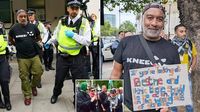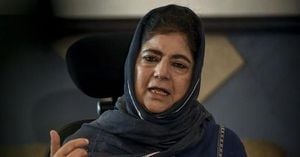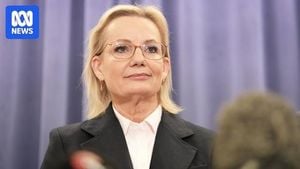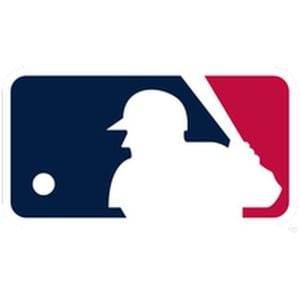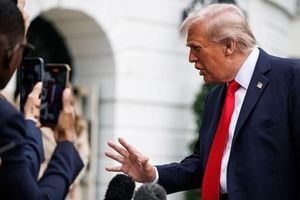The debate over free speech and state power in Britain has reached a fever pitch this August, as sweeping counterterrorism laws collide with the world of culture, protest, and dissent. In the space of just a few weeks, hundreds of demonstrators, artists, and even bestselling authors have found themselves under threat of arrest or prosecution for acts of solidarity with Palestine Action—a nonviolent group recently proscribed as a terrorist organisation by the UK government. The resulting legal and cultural battles have sparked fierce criticism from human rights advocates, ignited impassioned debate across the arts, and left many questioning the very boundaries of expression in a democratic society.
At the center of this storm stands Sally Rooney, the Irish novelist whose meteoric rise began with Normal People and Conversations with Friends. Rooney, just 34, is no stranger to controversy—her works have been lauded for their intimate explorations of millennial life and for their political edge. But her latest move has pushed her into uncharted territory: after pledging to donate all royalties from her books and adaptations to Palestine Action, Rooney now faces the possibility of arrest if she steps onto British soil. According to The Indian Express, the UK government’s July 2025 decision to ban Palestine Action means that "providing funds to, or publicly endorsing, a proscribed group is a criminal offence" under the Terrorism Act 2000. Rooney herself acknowledged the risk, stating, "If this makes me a ‘supporter of terror’ under UK law, so be it."
Rooney’s pledge, made public in an essay for The Irish Times, was unequivocal. Defending Palestine Action’s disruptive protests against Britain’s arms industry, she wrote, “Activists who disrupt the flow of weapons to a genocidal regime may violate petty criminal statutes, but they uphold a far greater law and a more profound human imperative: to protect a people and culture from annihilation.” She added, “I want to be clear that I intend to use these proceeds of my work, as well as my public platform generally, to go on supporting Palestine Action and direct action against genocide in whatever way I can.”
The legal risks are not hypothetical. Since July, when Palestine Action was banned after activists broke into an RAF base in Oxfordshire and vandalised aircraft, more than 700 people have been arrested—including many at a peaceful protest in Parliament Square earlier this month, according to The Indian Express. The UN Human Rights Office has sharply criticised the British government’s move, warning that “counter-terrorism legislation is being applied to a group that is not terrorist in nature and risks hindering the legitimate exercise of fundamental freedoms.” Their statement cautioned that the decision could have “a further chilling effect on the lawful exercise of these rights by many people.”
These warnings have not stopped British authorities from enforcing the new ban with gusto. In the week prior to August 21, more than 500 people—including hundreds of pensioners—were detained by police for holding signs supporting Palestine Action, as reported by The Guardian. Their apparent crime? Expressing support for a proscribed, but nonviolent, group. The government’s crackdown has extended to artists and activists, with anti-terror laws deployed against those who dare to challenge state policy or publicly oppose the ban.
The cultural fallout has been swift and dramatic. One of the most high-profile cases involves Mo Chara (Liam Óg Ó hAnnaidh), frontman of the Belfast rap group Kneecap. On August 20, hundreds of fans gathered outside Westminster Magistrates Court for a hearing in which Mo Chara faced terror charges for allegedly displaying a Hezbollah flag during a November 2024 gig at London’s O2 Kentish Town Forum. Prosecutors allege that Ó hAnnaidh not only displayed the flag but also said “up Hamas, up Hezbollah” on stage—actions interpreted as support for a proscribed organisation.
Supporters and legal experts, however, see the case as both technically flawed and politically motivated. As The Big Issue reported, Mo Chara’s legal team argued that the prosecution missed the six-month deadline to bring charges, potentially invalidating the case. A further hearing has been scheduled for September 26, leaving the outcome uncertain. In the meantime, Kneecap have continued to perform at major venues, including a show for 40,000 at Finsbury Park and a headline slot at Glastonbury—despite being banned from Hungary at the behest of Prime Minister Viktor Orbán. The band has consistently denied supporting Hamas or Hezbollah, stating, “we do not, and have never, supported Hamas or Hezbollah.”
For many of those rallying outside the courthouse, the case is about far more than one rapper or even one band. “For me, Kneecap created a community for me to talk about these issues, and meet other people about these issues,” said Roísín, a teacher and protester, to The Big Issue. “The main reason for being here is I want to use my voice for what’s going on in Gaza.” Others, like Yvonne Gribben, drew historical parallels: “I think Palestine and Ireland are very, very interlinked because of Balfour’s model of how they partitioned both countries. I think Kneecap are being vilified, and always have been vilified, by the British media, because they’re cheeky fellas from Belfast and Derry who actually have a love and an understanding of their culture, their heritage and their language.”
Public order conditions imposed by the Metropolitan Police, including restricting protests to a defined area outside the court, have only fueled perceptions that authorities are intent on suppressing dissent. The band themselves branded these measures an attempt to “portray support for Kneecap as somehow troublesome,” urging fans to comply “irrespective of how pitiful.” Protesters like Kashi Gill were blunt: “The far right likes to hijack the concept of free speech without an adequate understanding of what it means, and use it to justify hate speech. But I think in this instance, we’re seeing absurd allegations made against artists as a way of suppressing their stance to oppose genocide.”
As the legal battles grind on, questions mount about the future of free expression in Britain. Laurie Penny, writing in The Guardian, observed, “The wonders of modern technology have made it easier to disseminate bad ideas than at any previous point in human history. But for some self-appointed defenders of the Enlightenment flame, the greater threat is not state censorship – it’s historically marginalised groups daring to use that same technology, to hold power to account.” Penny continued, “The free speech that is worth defending is the right to speak back at power. The right to speak out of turn.”
With more hearings, protests, and potential prosecutions looming, the clash between Britain’s counterterrorism laws and the country’s tradition of cultural dissent is far from over. For now, artists, activists, and ordinary citizens alike are left to navigate a landscape where the line between protest and criminality has never been more sharply drawn.
